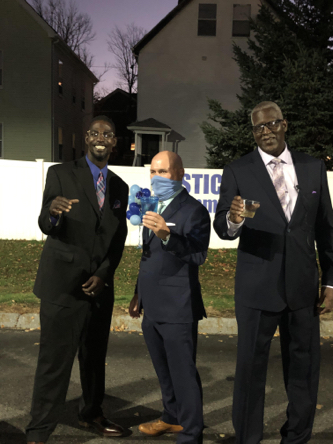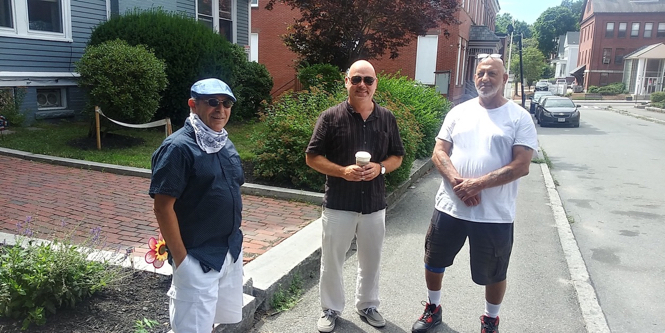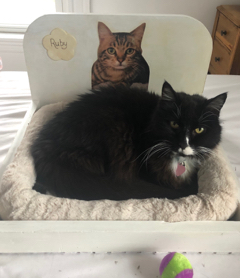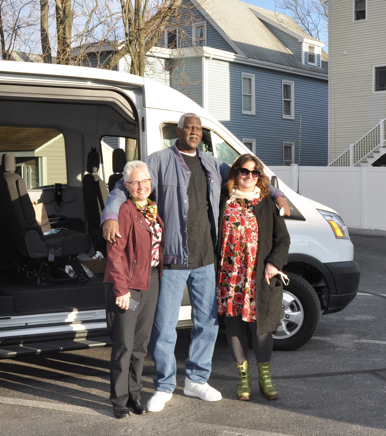It is OVER - James Watson Free After 41 Years
Dec.05.2020
61-year-old James J. Watson, the second man convicted for the 1979 murder of Jeffrey Boyajian of Swampscott, had his conviction overturned on November 5, 2020. Watson served more than 41 years in prison for a crime that he did not commit. Here is a video with interviews of James and his lawyers and investigators.

Although Watson was serving a sentence of life without the possibility of parole, he had been released from prison in April 2020 due to the strength of his wrongful conviction claims and the danger he faced of developing severe illness due to coronavirus. But the final court hearing on his murder conviction remained.
Then Watson's legal team got the news—it was over. Watson's conviction was overturned and prosecutors dismissed all charges against him. Watson's family and legal team met at his sister's apartment and planned a surprise party to break the news.
Watson's investigator, John Nardizzi of Nahant, devised a plan to get Watson out of the house for a few hours. On an unseasonably warm November afternoon, Nardizzi took Watson and his son, Donjuan Moses, shopping for clothes. They selected a lavender shirt to go with Watson's new custom suit. “I don't recognize that man,” joked Watson as he looked in the mirror at his new outfit, a decided upgrade from prison garb. “I could take Biden's job.”
When Watson came home, the surprise party was joyous as the family and legal team celebrated and sipped champagne. "All that matters to me is I get to comfort my dad now and do things with my dad now," said Moses.
Nardizzi and his team conducted critical investigation into the case, securing key affidavits from several witnesses. A Suffolk Superior Court judge cited evidence and "questions raised in this case of: hypnosis of identification witnesses . . and the potential testimony, rewards, and inducements of a highly inculpatory trial witness.”
Watson’s co-defendant, Frederick Clay, was exonerated 3 years ago after serving 38 years behind bars for the killing of Boyajian, a crime he maintained for decades he did not commit. But Watson's case lingered until a legal team came together to exonerate him.
"Jimmy Watson has a special strength to make it this far with mind, body and soul intact," said Nardizzi. He credited staff investigator Jill Vaglica with conducting several important witness interviews in the Watson case. "These cases are incredibly difficult to win and require a dedicated team of investigators, lawyers and experts. We had that team here. We are all thrilled for the Watson family," said Nardizzi.
Watson's attorney, Barbara Munro, said. “The greatest injustice is to take an innocent man away from his son and family," "This could have been prevented here if the then-prosecutor had not withheld from the defense the fact that the eyewitnesses were hypnotized prior to their identifications of Mr. Watson, rendering them unreliable.”
Co-counsel Madeline Blanchette added, “It is impossible to undo the intergenerational trauma that this wrongful conviction inflicted on Mr. Watson and his family, but his exoneration now means that there is still opportunity for healing,"
Watson’s co-defendant, Frederick Clay, was exonerated 3 years ago after serving 38 years behind bars for the killing of Boyajian, a crime he maintained for decades he did not commit.
Watson’s case was supported by Radha Natarajan, Director of the New England Innocence Project. Kristin Dame, Director of Private Social Work Services at the Committee for Public Counsel Services, provided reentry support services to Watson.
Dr. Mary Bassett of The Sentencing Project and Katharine Naples-Mitchell of the Charles Hamilton Houston Institute for Race and Justice at Harvard Law School also filed an amicus brief in support of Watson.

Although Watson was serving a sentence of life without the possibility of parole, he had been released from prison in April 2020 due to the strength of his wrongful conviction claims and the danger he faced of developing severe illness due to coronavirus. But the final court hearing on his murder conviction remained.
Then Watson's legal team got the news—it was over. Watson's conviction was overturned and prosecutors dismissed all charges against him. Watson's family and legal team met at his sister's apartment and planned a surprise party to break the news.
Watson's investigator, John Nardizzi of Nahant, devised a plan to get Watson out of the house for a few hours. On an unseasonably warm November afternoon, Nardizzi took Watson and his son, Donjuan Moses, shopping for clothes. They selected a lavender shirt to go with Watson's new custom suit. “I don't recognize that man,” joked Watson as he looked in the mirror at his new outfit, a decided upgrade from prison garb. “I could take Biden's job.”
When Watson came home, the surprise party was joyous as the family and legal team celebrated and sipped champagne. "All that matters to me is I get to comfort my dad now and do things with my dad now," said Moses.
Nardizzi and his team conducted critical investigation into the case, securing key affidavits from several witnesses. A Suffolk Superior Court judge cited evidence and "questions raised in this case of: hypnosis of identification witnesses . . and the potential testimony, rewards, and inducements of a highly inculpatory trial witness.”
Watson’s co-defendant, Frederick Clay, was exonerated 3 years ago after serving 38 years behind bars for the killing of Boyajian, a crime he maintained for decades he did not commit. But Watson's case lingered until a legal team came together to exonerate him.
"Jimmy Watson has a special strength to make it this far with mind, body and soul intact," said Nardizzi. He credited staff investigator Jill Vaglica with conducting several important witness interviews in the Watson case. "These cases are incredibly difficult to win and require a dedicated team of investigators, lawyers and experts. We had that team here. We are all thrilled for the Watson family," said Nardizzi.
Watson's attorney, Barbara Munro, said. “The greatest injustice is to take an innocent man away from his son and family," "This could have been prevented here if the then-prosecutor had not withheld from the defense the fact that the eyewitnesses were hypnotized prior to their identifications of Mr. Watson, rendering them unreliable.”
Co-counsel Madeline Blanchette added, “It is impossible to undo the intergenerational trauma that this wrongful conviction inflicted on Mr. Watson and his family, but his exoneration now means that there is still opportunity for healing,"
Watson’s co-defendant, Frederick Clay, was exonerated 3 years ago after serving 38 years behind bars for the killing of Boyajian, a crime he maintained for decades he did not commit.
Watson’s case was supported by Radha Natarajan, Director of the New England Innocence Project. Kristin Dame, Director of Private Social Work Services at the Committee for Public Counsel Services, provided reentry support services to Watson.
Dr. Mary Bassett of The Sentencing Project and Katharine Naples-Mitchell of the Charles Hamilton Houston Institute for Race and Justice at Harvard Law School also filed an amicus brief in support of Watson.
Who says there are limits?
Sep.11.2020
Who says there are limits? Limits on what you achieve? With friend & client Victor Rosario, free after 32 years; Tony Mazza, free after 47 years. Truth, faith, strength, hope ... Outlast the injustice.
By the way, Victor makes handmade wood cat boxes, call us to order one from him. 🔝😺


By the way, Victor makes handmade wood cat boxes, call us to order one from him. 🔝😺


James Watson is coming home - motion for new trial 🥊🥊🥊🙏🏼🙏🏼🙏🏼
Apr.16.2020
61-year-old James Watson was released from MCI-Norfolk last Thursday after serving more than 41 years in prison for a crime that he did not commit. Nardizzi & Associates Inc. conducted critical investigation into the case, securing key affidavits from several witnesses. A Suffolk Superior Court judge credited the investigation with "questions raised in this case of hypnosis of identification witnesses" and "the potential testimony, rewards, and inducements of a highly inculpatory trial witness, [which] raise significant and potentially successful issues." The Suffolk Superior Court issued an order on April 16 allowing Watson to be released from prison while his motion for a new trial is considered. The request was not opposed by Suffolk County DA Rollins’s office.
"Jimmy Watson has a special strength to make it this far with mind, body and soul intact," said Nardizzi, whose investigations firm whose investigations firm has helped free 5 clients in the past year after long prison sentences. He credited staff investigator Jill Vaglica with conducting several important witness interviews in the Watson case. "These cases are incredibly difficult to win and require a dedicated team of PIs and lawyers and experts. We're thrilled for the Watson family," said Nardizzi.
Watson also noted the urgency needed in his release due to his medical conditions and age. The factors put him at risk of severe illness and death due to the coronavirus pandemic. Watson was convicted in 1984 of murdering taxi driver Jeffrey Boyajian in Roslindale. He has maintained his innocence since his arrest in 1979, attorneys Barbara Munro and Madeline Blanchette said in a statement. “We are grateful to the court for making it possible for Mr. Watson to be released to seek the urgent medical care he needs,” Munro said in the statement. “What a gift and a privilege to witness this amazing man walk out of prison after 40 years, with his sense of humor and compassion for others still intact.”
The case against Frederick Clay, Watson’s codefendant, was vacated three years ago after former Suffolk District Attorney Dan Conley’s office "raised significant doubt as to the fairness of his trial." Hypnosis had been used to aid witnesses in Clay's trial as well. The practice is not considered a reliable scientific technique in aiding witness memory.
Watson's legal team will continue to work to exonerate him in the coming months as the state conducts an investigation into his case. Watson will spend time out of prison “regaining his health and rebuilding his life after decades of separation from his beloved family,” the attorneys’ statement said.
“I have waited 40 years already, so waiting a few more months is easy. The truth will set me free,” Watson said in the statement.

"Jimmy Watson has a special strength to make it this far with mind, body and soul intact," said Nardizzi, whose investigations firm whose investigations firm has helped free 5 clients in the past year after long prison sentences. He credited staff investigator Jill Vaglica with conducting several important witness interviews in the Watson case. "These cases are incredibly difficult to win and require a dedicated team of PIs and lawyers and experts. We're thrilled for the Watson family," said Nardizzi.
Watson also noted the urgency needed in his release due to his medical conditions and age. The factors put him at risk of severe illness and death due to the coronavirus pandemic. Watson was convicted in 1984 of murdering taxi driver Jeffrey Boyajian in Roslindale. He has maintained his innocence since his arrest in 1979, attorneys Barbara Munro and Madeline Blanchette said in a statement. “We are grateful to the court for making it possible for Mr. Watson to be released to seek the urgent medical care he needs,” Munro said in the statement. “What a gift and a privilege to witness this amazing man walk out of prison after 40 years, with his sense of humor and compassion for others still intact.”
The case against Frederick Clay, Watson’s codefendant, was vacated three years ago after former Suffolk District Attorney Dan Conley’s office "raised significant doubt as to the fairness of his trial." Hypnosis had been used to aid witnesses in Clay's trial as well. The practice is not considered a reliable scientific technique in aiding witness memory.
Watson's legal team will continue to work to exonerate him in the coming months as the state conducts an investigation into his case. Watson will spend time out of prison “regaining his health and rebuilding his life after decades of separation from his beloved family,” the attorneys’ statement said.
“I have waited 40 years already, so waiting a few more months is easy. The truth will set me free,” Watson said in the statement.

Massachusetts court research - criminal records
Apr.07.2020
With access to court records curtailed, we are finding new ways to get clients the information they need… Facts are lonely things, so don't keep your distance.Call anytime to get your investigation underway (781) 596-8200.
"The powerful play goes on..."
Apr.07.2020
"The powerful play goes on and you may contribute a verse."
- Walt Whitman

- Walt Whitman

Fantastic Beasts of the Background Check World: the "national criminal search"
Feb.21.2020
Every investigator gets phone calls like this. The tone excited, the tenor demanding. How can you, sir, charge so much money for a background check when other firms offer "national criminal record checks" for $24.95?
 Our response is: Do you want to buy a griffin? A hippogriff (half-horse, half-eagle, 100% fantasy)? Time to review Fantastic Beasts of the background check world.
Our response is: Do you want to buy a griffin? A hippogriff (half-horse, half-eagle, 100% fantasy)? Time to review Fantastic Beasts of the background check world.
The national criminal check is a myth. What constitutes a “national criminal check” or “nationwide employment criminal background” as the product is often described? Usually, the firm offering this search is checking a compilation of conviction data--people who actually were sentenced to prison. However, only a very small percentage of people charged with crimes ever do any prison time. National offender databases are misleading: they miss charges that have been pled out, dismissed, not prosecuted (nolle prosequi, the legal term of art meaning the prosecutor is unwilling for some reason to pursue the case).
How do you actually check for Criminal Records?
Everyone is familiar with scenes from movies where a law enforcement agent runs a quick database check and gets an entire criminal history in seconds. In real life, things tend to be a bit more convoluted.
One database used by law enforcement is the National Crime Information Center (NCIC) and it is typically limited only to law enforcement. While the closest thing to a national criminal records database, even NCIC data is riddled with gaps, with as many as 50% of all criminal cases failing to hit the database. So how do you proceed to check a person for crimes committed across 50 states in the USA?
Convictions data is a start but we always go back to the primary sources of criminal records: the state court system. On the state side, this means searching a higher court (Superior Court) that handles major crimes in a particular county, as well as lower courts with more limited jurisdiction. These courts are called district courts or municipal courts. Don’t make the mistake of skipping this step as district courts can hear cases involving serious criminal matters; for example in Massachusetts, some felony cases are found in district court. And access to the dockets still remains mixed: Massachusetts still keeps criminal records off the internet; you need to look at the index in the court.
And on the federal side, you will be checking for criminal cases in the national PACER system.
So just beware when you are conducting a criminal background check for employment or any other purpose: to do it right, the investigator may need to leave the office and review records ((paper or database) at the courthouse. Be certain that you are buying more than the fantastic beast of a "national criminal check" which is usually just convictions data.

The national criminal check is a myth. What constitutes a “national criminal check” or “nationwide employment criminal background” as the product is often described? Usually, the firm offering this search is checking a compilation of conviction data--people who actually were sentenced to prison. However, only a very small percentage of people charged with crimes ever do any prison time. National offender databases are misleading: they miss charges that have been pled out, dismissed, not prosecuted (nolle prosequi, the legal term of art meaning the prosecutor is unwilling for some reason to pursue the case).
How do you actually check for Criminal Records?
Everyone is familiar with scenes from movies where a law enforcement agent runs a quick database check and gets an entire criminal history in seconds. In real life, things tend to be a bit more convoluted.
One database used by law enforcement is the National Crime Information Center (NCIC) and it is typically limited only to law enforcement. While the closest thing to a national criminal records database, even NCIC data is riddled with gaps, with as many as 50% of all criminal cases failing to hit the database. So how do you proceed to check a person for crimes committed across 50 states in the USA?
Convictions data is a start but we always go back to the primary sources of criminal records: the state court system. On the state side, this means searching a higher court (Superior Court) that handles major crimes in a particular county, as well as lower courts with more limited jurisdiction. These courts are called district courts or municipal courts. Don’t make the mistake of skipping this step as district courts can hear cases involving serious criminal matters; for example in Massachusetts, some felony cases are found in district court. And access to the dockets still remains mixed: Massachusetts still keeps criminal records off the internet; you need to look at the index in the court.
And on the federal side, you will be checking for criminal cases in the national PACER system.
So just beware when you are conducting a criminal background check for employment or any other purpose: to do it right, the investigator may need to leave the office and review records ((paper or database) at the courthouse. Be certain that you are buying more than the fantastic beast of a "national criminal check" which is usually just convictions data.
Thank you to clients & contractors who made 2019 our best year ever!
Jan.07.2020
🙏🏼 to clients & contractors who made 2019 our best year ever. From the exoneration of Gary Cifizzari, to getting charges dropped against Kevin Spacey, to consulting on exonerations of Curtis Flowers and Rickey Birch - 2019 is a year to savor!🥂